
For the first time, Gerson Ortiz talks about his exile publicly, reviewing the chain of events that took him from Guatemala to Costa Rica to flee persecution. For this report, he reviews everything that has happened so far in 2023 and contemplates the resulting dizziness and confusion. At the age of 39, he worked as editor and editor in chief of the newspaper El Periódico, directed by José Rubén Zamora, until November of last year. Harassment from the government and elite allies of Alejandro Giammattei resulted in the director’s arrest and imprisonment and the newspaper being cancelled.
Along with seven other journalists, Gerson informed Zamora about the judicial process. That was the crime, since they were all accused of obstructing justice by doing their job in a “malicious” manner, according to the charge. This is one of the latest cases that have set off all the alarm bells for independent journalism in the region. And Costa Rica has become a refuge for those who have risked their safety and lives to practice their trade, despite the circumstances.
You’re watching all those things that are happening in a different space and your mind knows it. It’s like watching the rain from a window; you’re aware that it is raining, but you’re not getting wet,” he reflects.
It’s disconcerting on a professional and personal level, emotionally, he remarks when remembering the experience that began one Friday when he arrived in San José with an atmosphere that he had never felt, exhausted by the trip, welcomed by a leader of the organization who took care of him and with the suspicion that running away wasn’t a great solution either. “I didn’t know if I was getting things together in my life or making much more of a mess, and that’s a feeling that stayed with me for several days.”
Gerson still doesn’t have a lot of answers about what happened. Not to mention about the future. At times, he gets uncomfortable talking about himself, but he also understands that his story is the same as many others in Central America and that’s why he agrees to share it. There are individual journalists or even entire media outlets that have migrated to Costa Rica trusting in its institutional strength, in the rule of law, and even the Costa Rican system’s tradition of asylum, although there are also new immigration rules that make life difficult for new arrivals. Some have chosen it as the least inconvenient destination, while others have just allowed themselves to be brought by organizations that quickly relocate them to Costa Rican soil. There are reporters who arrived anonymously and continue that way. Not all of them apply for refugee status. Some have left and returned, and others have left quickly for a third country. The number of reporters protected in Costa Rica is uncertain, but a conservative estimate exceeds 150 reporters and 20 media outlets.
Most of them come from countries where journalism is a direct victim of authoritarian ways, the deterioration of people’s access to truthful information and the aspiration to extinguish dissident voices. Journalists face problems related to uprooting and subsistence in a country that provides refuge but is also the most expensive in the region.
The country that has forced out the most journalists to Costa Rica in recent times has been Nicaragua. In the last five years, they have suffered exile, in addition to judicial processes for practicing their profession, confiscation of assets and even having their nationality taken away. In Costa Rica, in addition to suffering a blow to their identity, they face the cost of living. The average salary of a Nicaraguan journalist only pays the rent for a house in Costa Rica.
The Personal Cost of Telling About What’s Happening
Álvaro Navarro, journalist and director of the Nicaraguan media outlet Artículo 66, breaks down now when telling his story.
If you ask me who I am, I’ll tell you that I’m a Nicaraguan from Cinco Pinos, from Chinandega (a department along the border with Honduras) who grew up swimming in its rivers and that I have breathed Nicaragua all my life (…) How can this pair of tyrants tell me now that I’m not Nicaraguan!” he says, crying with rage in a plaza outside of San José”.
He chose to live in Costa Rica to be less exposed than the residents of the capital after he arrived with just his computer and a change of clothes.
It was in June of 2021 when he managed to escape before he was probably going to be arrested, when the Daniel Ortega regime was making an advance against critical journalists and dissident politicians. In his case, he already had a court summons for some of the reasons that were created to persecute people designated as “coup plotters.” An agent of the regime warned someone from his team: “So that later they don’t say that I didn’t behave like a dick, tell Álvaro to move because this weekend they’re coming for him.” The warning was serious, but he had also seen how the authorities had taken over the media outle Confidencial, directed by renowned journalist Carlos Fernando Chamorro, and he understood that nothing would prevent Ortega from acting against smaller ones. When the Police arrested legendary former commander Dora María Téllez one Sunday, Navarro was already hiding on a farm on his way to Costa Rica, computer in hand.
“Having the responsibility of a communication medium, I had to find a way out to protect myself and also to be able to continue doing journalism,” explains the director of the news outlet that he founded six months before protests broke out in April of 2018, the detonator for government repression. Five years later, in the tally, there are murders, imprisonments with torture, expatriations and confiscations against critical, dissident or opposition voices. Navarro managed to flee from that, and now he feels safe, despite knowing that there are also agents of the Sandinista political party in Costa Rica, and even though the cost of living is doubled. From here, he directs the work of the journalists who remain in Nicaragua, underground.
He traveled to Costa Rica because of its proximity, because of the presence of thousands of other Nicaraguans and because of the conditions to continue doing journalism for his country, thinking of preparing for the moment when Ortega and Murillo’s power collapses and many of those who have fled can return. Meanwhile, he is overcoming the most basic obstacles, including immigration, with the tools provided by institutional guarantees, since in February, he managed to get the Constitutional Court to annul the impediment to leaving Costa Rica for refugee applicants, a measure included by the Chaves administration, based on the idea that many of the immigrants are not really persecuted for political reasons and that, in reality, they’re just looking for a better life. That same decree, still in force, limits the ability to work legally and requires that the refugee application be presented within the first month, regulations that human rights organizations consider to be contrary to international standards.
So far, Jennifer Ortiz, like Álvaro, has also resisted giving up journalism, although she feels that there have been many obstacles. She is a journalist and the director of the media outlet Nicaragua Investiga, and she is experiencing a new exile in Costa Rica, her third one. She first left Nicaragua in 2019, but economic difficulties made her return to her country. However, political circumstances forced her to settle in San José again. Now she lives here with her three children, who are 13, 9 and 4 years old. The “third exile” has more to do with her family history, since her father took refuge in Costa Rica during the Nicaraguan civil war in the 1980s, since he supported the movement against the Sandinista revolution that Daniel Ortega was leading at the time.
Now I can sit down and see in hindsight that, with my family history, I can make a general mapping of the recent history of Nicaragua…. I just hope that my children don’t have to live through this, too,” Jennifer said in a tortilla shop near her house. She avoids talking about this in front of them so they don’t worry more.
They are the reason why she allows herself to doubt whether to continue doing journalism or to continue in Costa Rica. There’s the possibility that Spain will give them nationality as they’ve done for other Nicaraguan colleagues, and Ortiz doesn’t rule out crossing the ocean in the future to make sure that they have better lives. Her eldest daughter has told her that at school, they’ve warned her about delinquency in the high schools, not surprising to anyone who reads the news in recent months in Costa Rica. The journalist is concerned not only about security in the face of political threats, but also about common crime and the deterioration of the welfare system that characterized Costa Rica for decades, now with education and public health seriously in question.
“I’m not going to be the heroine; many times, I’ve questioned myself. Why do I keep doing it? I have asked myself if my children really deserve that I have exposed them to all of this, because they have gone through the same risks that I have.” They’ve lost two years of studies, the eldest has become depressed and the youngest wonders if he is Nicaraguan, too. At least she is with them now. The second time, she had to leave them for a few months in Nicaragua, at their grandmother’s house, because she feared that the police would arrest her on the way to Costa Rica and the children would end up abandoned.
A Lifesaver For Many
Jennifer Ortiz remembers when she was coming at full speed on a motorcycle on rocky and muddy roads. She was crying because of having abandoned the little ones during the emergency without explaining to them what was happening, even though they knew that things had been going wrong for a long time because they lived almost shut inside in Managua, without contact with other family members or friends, changing houses and with strong security measures since they were attacked with a Molotov cocktail that was thrown at their home. Jennifer knew that they were threats due to being a journalist and due to directing a media outlet that got started with the 2018 crisis and that forced her to leave behind the audiovisual production venture.
She had a well-known career in television and, in addition, Nicaragua Investiga began to grow in circulation due to information about the protests and government repression. She was an easy target for the government. That’s why they included her on a list of people that Rosario Murillo read one day on television. They were “coup plotters” and they were going against them. Jennifer wasn’t watching the channel, but she was warned that she was included on the list and she understood that it was time to escape on paths to Costa Rica.
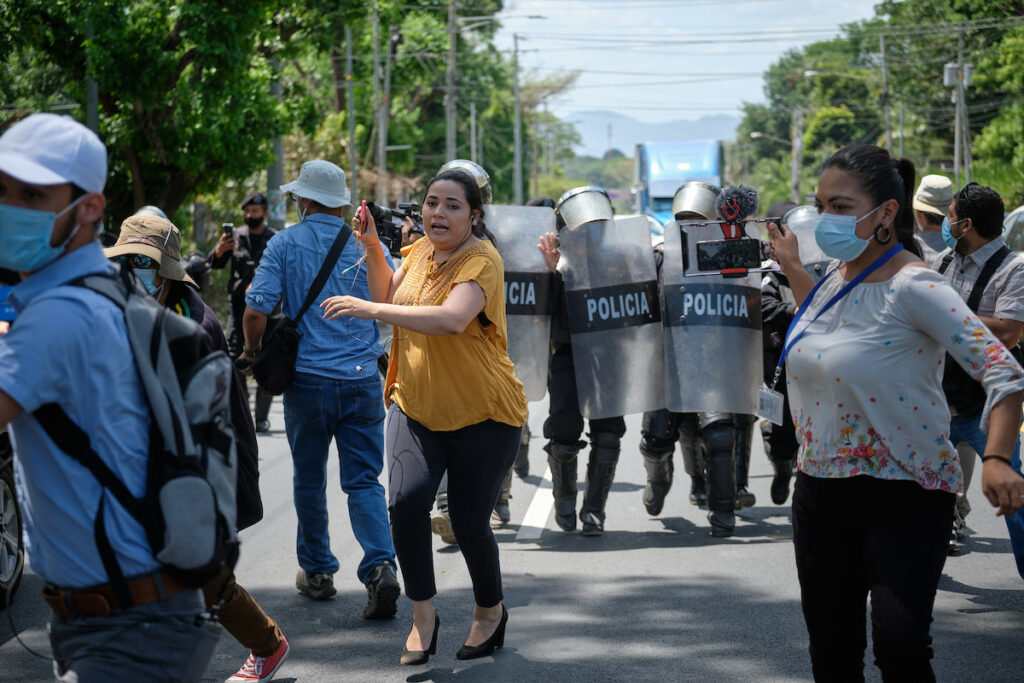
Jennifer Ortiz immigrated to Costa Rica just like her parents did decades ago. From here, she directs Nicaragua Investiga, the media outlet that she founded at the time of the social outbreak in her country in April of 2018.
Past the military checkpoints and feeling safe, she sat in a bus stop shelter and wondered what she was doing there, but returning again was not an option. She had contacts with other colleagues and activists, but she didn’t want to bother them either because she knew that there were many arriving and the resources were few for taking them in. Some 180,000 Nicaraguans have requested refuge in Costa Rica since the 2018 crisis, according to official reports. Journalists are only a small portion: independent reporters, correspondents from international agencies and entire editorial teams, including the team from Confidencial and the newspaper La Prensa, a leading newspaper in Nicaragua with 96 years of history. In the midst of heavy pressure on immigration, there are communicators whose appointment to obtain legal refugee status is scheduled for after 2028. At the moment, they are “applicants.”
This Nicaraguan experience was also valid for the Salvadoran digital newspaper El Faro, which moved to San José at the beginning of 2023. Its legal address and accounts are no longer in San Salvador, where the newspaper has been the target of abusive accounting audits. In 2020, President Nayib Bukele said on a television network that he would investigate El Faro for money laundering and, in April of 2021, the first accusation came. No explanation has been enough, and the managers soon understood that they had to look for another home.
It was quite clear that we were going to Costa Rica because we already had the experience of the Nicaraguans and because of the degree of stability and the democratic culture of the country,” explains Carlos Salamanca, general manager of El Faro.
Guatemala was already showing an advanced dismantling of the institutionality, in Nicaragua, it wasn’t even possible to enter, and Honduras is recognized as one of the most dangerous countries for journalists, but the idea was to stay in Central America, and only Costa Rica was viable. El Faro’s journalists are where they always were, the majority in El Salvador, despite threats from the Bukele government. Twenty-two members of the media outlet have at some point had their phones tapped by Pegasus spyware, as verified by the expertise of two specialized organizations that analyzed the Israeli manufacturing system that is only sold to governments and state institutions.
Added to this are smear campaigns, digital harassment and the threat posed by measures adopted by the government within the framework of the emergency regime decreed to reduce murders linked to gangs. Now, a journalist can be sentenced to up to 15 years in prison for publishing information that “creates anxiety and panic in the population” by reproducing or disseminating messages from gang groups.
“The dismantling of our democracy, the lack of controls on how power is exercised by a small group, the attacks on freedom of press and the closure of all transparency and accountability mechanisms in El Salvador seriously threaten the citizen’s right to be informed, beyond the numerous public resources intended today to disseminate propaganda and false news,” said El Faro’s editorial on April 13.
“The criminalization of journalism is, unfortunately, increasingly used by governments in the region, parallel to the accumulation of power and the weakening of democratic institutions and civil movements. The autocrats don’t tolerate other narratives,” it added before warning that in Costa Rica, “there is still a division of powers, the right to legitimate defense and respect for the rule of law.”
Leaks in the Refuge
El Faro confirmed what many organizations have said before when referring to Costa Rican territory as a safe zone for freedom of the press. It offers constitutional guarantees and a legal system that makes the division of powers possible, with a political culture that led governments to restrain themselves in their actions and in the usual conflicts that democracies host between authorities and the media. Organizations such as Reporters Without Borders and the Office of the Special Rapporteur for Freedom of Expression of the Inter-American Commission on Human Rights (IACHR) also say this, but to immediately warn of negative signs that have arisen under the current government administration of Rodrigo Chaves, due to acts such as insults against journalists or media, stigmatization and lack of transparency.
In addition to verbal attacks against critical media from Chaves — who has a popular approval of around 70% — administrative actions have affected the traditional newspaper La Nación and the digital media outlet CRHoy, as well as the disclosure of alleged irregularities in a state contract — during the previous administration — for hiring the services of journalist Vilma Ibarra, whose radio program Hablando Claro is another of the dissident forums. Although the president didn’t dare to identify the communicator or reveal the auditing firm in the case, on social networks, accounts related to the government have already issued their own judgment with the name and surnames.
The journalistic union and the authorities are still waiting for the full sentence of an unprecedented ruling issued in May by the Constitutional Court against President Rodrigo Chaves for calling journalists “hitmen” during a televised press conference. The judges accepted the constitutional appeal of journalist Jason Ureña, from CRHoy, because they warned of an excess in Chaves’ speech and the risk of greater harassment of the media and reporters as a consequence.
The normalization of verbal violence against a journalist is something very serious in a democracy, especially coming from the head of state,” the press release indicated, but the court’s full argument had not been disclosed by the deadline for this article.
Chaves hasn’t commented on this ruling, but months ago, he accused the constitutional judges of engaging in “contortionism” by issuing a ruling in which they described the government’s decision to cancel the permit of an event center called Parque Viva as an indirect attack on freedom of the press. The event center is owned by the La Nación business group, which he promised to destroy during his campaign, along with the Teletica television station.
The president denies that he attacks the press and says that he only defends himself against wrong or ill-intentioned information in favor of powerful groups, that he would be the first to take to the streets to defend freedom of expression and the right to information. Legislator Pilar Cisneros, head of the caucus of the president’s party, backs him up. She entered politics after a long journalistic career in the three media outlets most criticized by Chaves, always known for speaking strongly against the political class. She has said that there are media “digging their own graves” within an environment that tends to polarize.
In the Legislative Assembly, the main shareholder of CRHoy, businessman Leonel Baruch, said under oath that in August, she suggested joining efforts to do away with La Nación, but the legislator insists that she met with him just to talk about the situation in the country and ask him to moderate the media outlet’s editorial line. This intention would seem innocuous if it weren’t for the fact that CRHoy is one of the main media unfavorable to the government and because the Ministry of Finance later published, in January, a report against Baruch for alleged tax evasion by his bank, BCT, although the supporting documents have not been published either.
The record of acts against the media is growing and alerts are active in the union, in organizations defending freedom of press and in some voices, just a few, from opposition parties that dominate the Legislative Assembly. “Look at Latin America again. The press has been the first [thing] that they have blocked and have caused to fall as a means to weaken and throw away democracy. The press is a front; it’s a wall so that democracy doesn’t fall,” said opposition legislator Vanessa Castro. “[Chaves] attacks what he can’t control. Since he can’t make the media bend, what he does is find a way to undermine it,” the legislator added in another speech in the legislative plenary session. Until recently, she was the legal representative of Repretel, the national television company that is part of the Albavisión conglomerate, owned by Mexican Ángel González, whose newscast in Costa Rica is free from the reproaches and attacks of Rodrigo Chaves for now.
The Government seems determined to redefine the criteria for allocating state advertising funds in a “democratization” that can favor new information forums, including some that receive kind treatment from the president. The renewal of radio and television frequency assignments is also on the horizon, something that the president himself recognized as worrying for certain communication media. Other journalistic projects lament the distancing of private companies that have reduced their advertising so as not to displease the executive branch, according to two people consulted for this report.
“There is a tension that we’ve never experienced,” says the director of a media outlet who prefers not to reveal her name. “I don’t want them to strike at us again and again too. We have to be strategic for the survival of the company, because this is going to happen and we have to continue here,” she adds before apologizing.
The danger of self-censorship is understandable, recognizes Yanancy Noguera, elected in November as president of the College of Journalists of Costa Rica after a union election that was not free of the struggle between supporters of Chaves and his critics. She adds that some media are also being complacent, hoping to get advertising, especially small platforms in the regions.
The Signs Are There. The Question Is: How Long?
Álvaro Navarro has seen this in the news and recognizes some similarities with past events in Nicaragua. He remembers when Daniel Ortega met cordially with the journalists’ union to tell them that he planned to have a better distribution of state advertising or, some time later, when he referred to the newspapers El Nuevo Diario and La Prensa as “the pamphlets of the North Highway” in reference to the area of the capital where they were located. Now, in the piece of land of the first, there is only rubble and in the other, La Prensa’s, there is only one building under government possession, while the newspaper’s former manager is serving a sentence for “money laundering” and two workers were also sentenced for “propagating false news” and “conspiracy against national integrity”, two of the types of ad hoc laws that work in a way that allows the regime to persecute anyone it considers adverse.
That’s why Navarro insists that nothing can be taken lightly. “What I’m saying is that it’s evident that there is an institutional framework here in Costa Rica that we don’t have in our other countries, but nothing is ironclad if we start from the fact that governments are always trying to ensure that no one inspects what they’re doing or controls them.” He sees the need for an active defense like the one that the Nicaraguan media articulated when the fire was already in the kitchen, so to speak; perhaps too late.
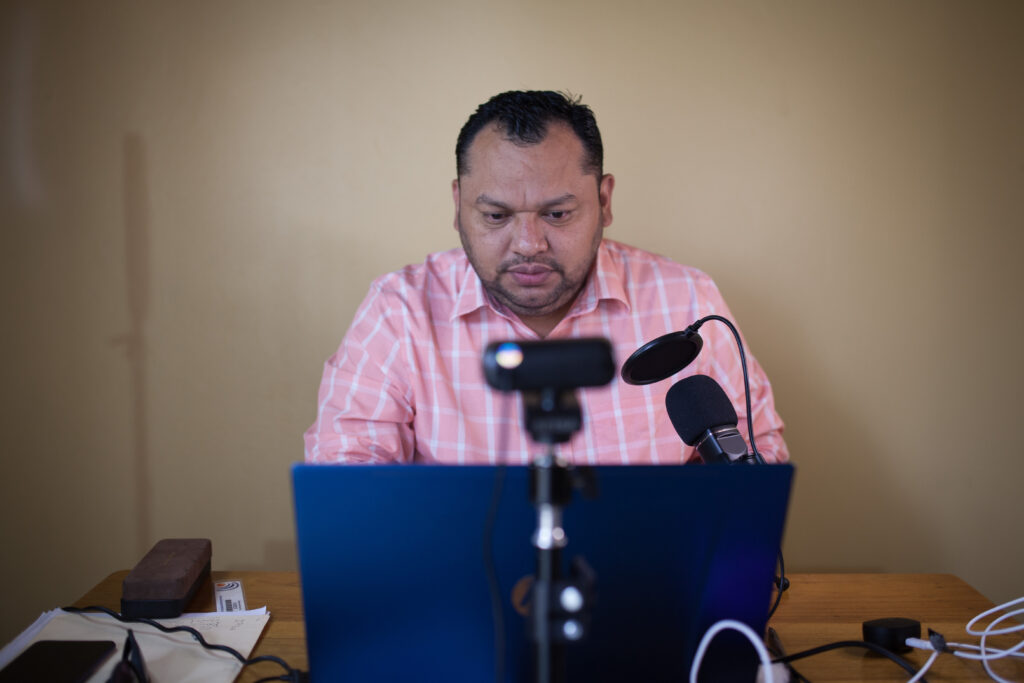
Álvaro Navarro, director of Artículo66, came to Costa Rica in June of 2021 after receiving a warning from an agent of Daniel Ortega’s administration.
Hence the mutual support. One part of the journalistic union welcomes and provides support, but the newcomers end up giving encouragement as well. “What should have been a natural refugee dynamic is now more complex, because we have even experienced situations in which Nicaraguan colleagues give support and guide colleagues from Costa Rica,” says Noguera, who sums up the situation this way: “The environment is heavy.”
Gerson has also seen these signs in Costa Rica, but he also remembers convictions from the Inter-American Court of Human Rights against the country, based right here in San José, due to violations of freedom of press against Costa Rican media or journalists in prior years. There are no places that are impervious to threats, he agrees, but there are advantageous conditions to keep the practice of journalism safe and, above all, a climate that promotes quality information for the population.
Costa Rica can continue to be this country that, even though it belongs to the region, remains far off from the collapse of democracies,” he says after warning that when you are on the ground, it’s often difficult to measure risk, as he believes happened in Guatemala.
In other words, Costa Rica still has the opportunity to preserve itself as the Central American oasis for freedom of press. “Look, I can’t say how it is for journalists who report on Costa Rican affairs, but I can tell you that I feel safe here to do the journalism that we do,” Jennifer replies, despite the “heavy hand of Sandinism” that can also move in Costa Rica. It’s true that on Costa Rican soil, there are no imprisoned journalists or newsrooms that have been raided, as Chaves himself has said to reject being questioned about his relationship with the press and spurn accusations such as those from Reporters Without Borders, which showed that Costa Rica dropped by 15 positions in the 2023 freedom of press ranking.
Conditions seem sufficient for journalism from exile, at least as long as cooperating international organizations continue to provide support under the understanding that it’s an essential public service for their countries. The question is for how long? At least one organization has already considered whether it is advisable to dedicate its funds to the situation in Nicaragua due to the feeling of how little can be recovered.
The biggest challenge is personal survival, emotional sustainability in the face of being suddenly stripped of surroundings, family, friends or even nationality. The possibility of falling or getting tired is latent, and there’s the temptation to flee to a third country to earn a living in a job other than journalism, which was the reason they left their land.
“I can firmly answer questions about journalism, but on personal matters, I break down. It hits me very hard because I feel that burden, I feel guilty and I say, ‘Why? Why do I feel guilty? If the criminal is Ortega, why do I feel guilty?’ I feel guilty because my children have paid the consequences of a job that I decided on, that I took on, and it doesn’t seem fair to me,” she says, unable to avoid tears. She calms down, breathes and adds: “But hey, in the end, this is also part of our life. We make a living from it. You take a hit but at the same time, it gives you life and it’s so hard to know how to live with that.”
The days of not having a chair to sit on or a snack for the children have passed. She is happy to see how she has managed to rebuild or resist without stopping doing the journalism that is necessary so that Nicaragua can also resist and one day rebuild.
Her colleague, Navarro, also looks toward the uncertain future, but with hope. “Yes, Nicaragua has been seized, but that won’t last forever and the opportunity to go there again will come.” That’s why you have to feed citizen awareness with journalism and that’s why you have to try not to lose heart, even if it costs too much. He has been in exile for two entire years now, and he still falls apart when he remembers that a human rights defender welcomed him into his house in Costa Rica and offered to lend him pants. To him, it was what indicated that he had come here for a long time and that the tests of resistance were beginning.
“I try to pretend that things don’t affect me because I’ve also always been someone who looks ahead, carrying the load and, if I can’t, then kicking it to the ground, but in the end, it hurts to know that you’re in a foreign country not because you want to be, but because they kicked you. And yes, because we decided to continue doing journalism”. Others haven’t managed to do that.
_______________________________________________________________



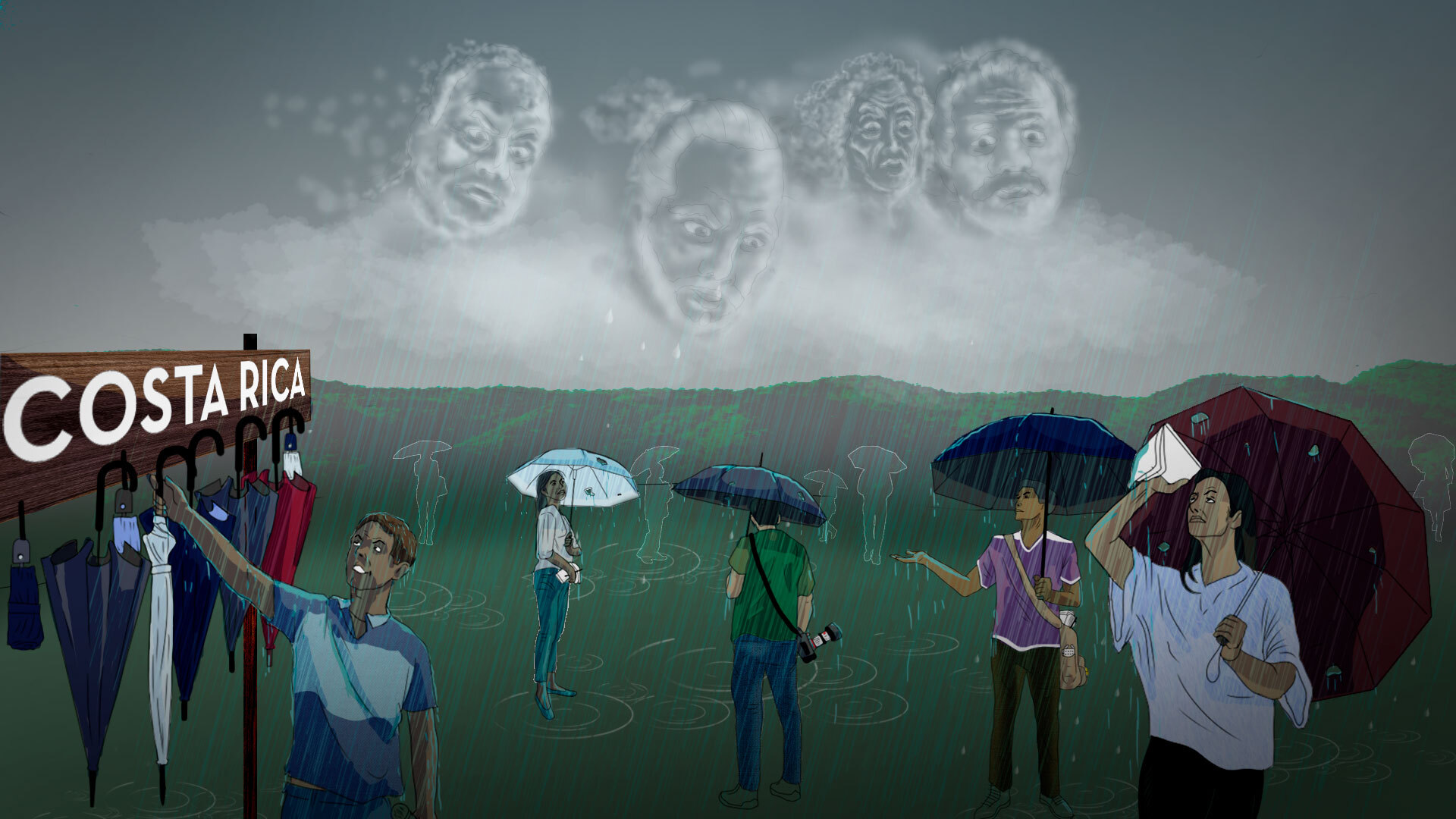
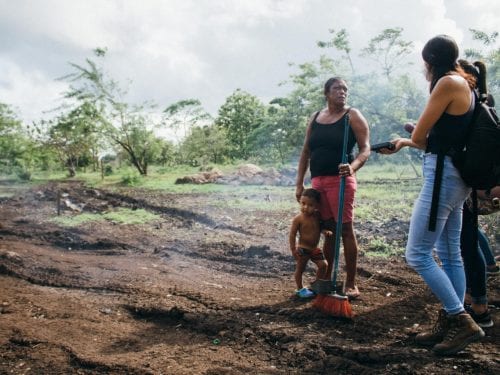
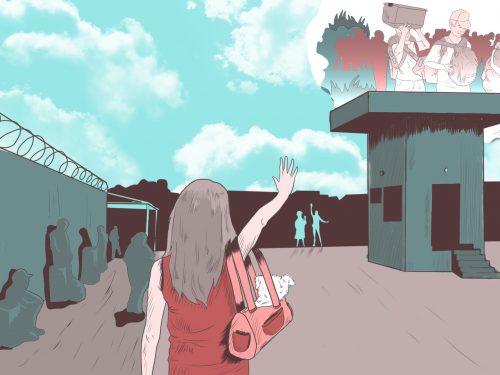


Comments